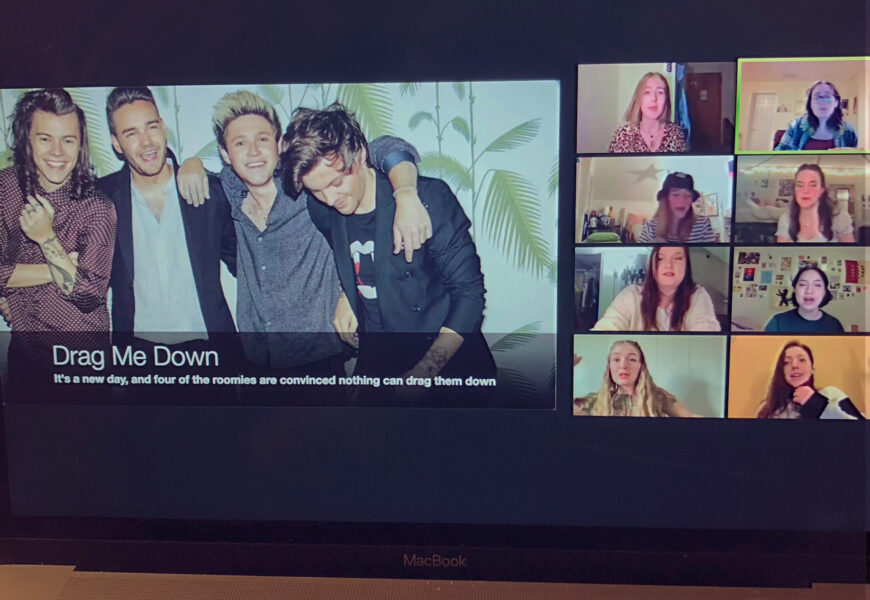Photo courtesy of Brooke Sponzo.
“I think if One Direction saw this, they would be both horrified and thrilled,” comments Payton Ferris ‘23 of Wig and Candle’s recent production No Control, a satire based on the members of the smash-hit 2010s boy band. The show, written by Martha Kenyon ‘21 and Emma Niiler ‘20, was structured as a murder mystery in which Ferris’ character Zayn went missing in the aftermath of an unexpected plane crash.
No Control took place over Zoom, with participants receiving special instructions by the crew on how to hide non-video participants (of which there were 71). This digital setup “made the show a lot more accessible to students who are remote, including some of our cast,” notes Katherine Hurst ‘22, who served as the show’s stage manager. “Additionally, the show itself is humorous and flexible in a way that lends itself very well to the online format.”
And I’d have to agree: the live chat was active and populated throughout the performance, with audience members and even a few actors pitching their thoughts about the plot. “Romeo and Juliet could never” one participant chimed in of the show’s Niall/Zayn relationship, while others posted similar sentiments like “#ziall #otp” and “Niall fans forever <3.”
“I loved the audience participation,” says Emily Cowan ‘21, who took on the role of singer and fashion icon Harry Styles. “It added something that’s just not possible (or acceptable) in a staged performance. Some of the comments in the chat were so funny that I broke character a few times.”
There were moments built into the story where viewers could take their involvement to the next level too, by turning on their cameras and dancing along to some of the band’s biggest hits. Some eager watchers even switched on their cell phone flashlights to wave around, emulating a real 1D concert. Ferris attributes this enthusiasm to the show’s unusual platform: “we had to amp up our reactions for the Zoom barrier,” creating an energy that participants jumped to mimic in their spirited engagement.
The show also featured a gender-flipped cast, with the band’s leading men portrayed as women—Leah Payne, Perri Styles, etc.—as a way to both parody and comment on the female-dominated nature of the musicians’ fanbase. “I didn’t like 1D because I thought it was ‘too girly,’” admits playwright and director Martha Kenyon, “so to take something that’s perceived as less-than (because our society hates teenage girls) and reclaim it… I don’t know, it’s a redemption of sorts.”
I asked the cast and crew what it was about One Direction that helped their music and members remain viable pop-culture references. “It was such a big part of life for our generation for several years,” explains Hurst. “From mega-fans to apathetic bystanders, we were all aware of them to some degree.”
“People love boybands,” remarks Kenyon. “One Direction happened at a very formative time in current college students’ lives. Name one person who hasn’t heard ‘What Makes You Beautiful.’” Cowan argues that it’s the idea of a well-functioning team that sticks with people: “there’s something very relatable about a group of people from different backgrounds, or a group of friends, coming together over a common goal—and a mixture of people makes it easier for everyone to find a member to relate to.”
“Their songs were, and still are, so catchy,” is Ferris’ belief; Kenyon adds that “there’s something really bonding about laughing with others.” And during such a hectic year, Camels are more than happy to turn to nostalgia, to recall the summer jams of 2011 and 2013 and abandon mid-term stressors to sing along to the “Best Song(s) Ever.”










